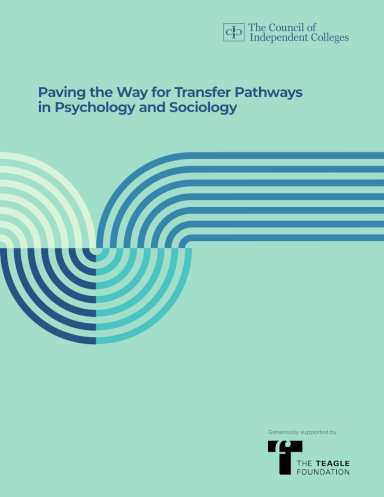The Independent Transfer Pathways in North Carolina Project served as a catalyst in forging a culture of cooperation between community colleges and independent colleges and universities in North Carolina by creating a unique opportunity to bridge the gap between the two systems. The project focused on developing discipline-specific articulation agreements, exploring financial aid options, and identifying best practices for advising. By bringing together senior leaders, deans, faculty, and staff from many different departments and institutions, this innovative partnership project provided opportunities to enhance efforts to build new relationships and remove obstacles that reduce historical effectiveness with the transfer student population. The partner campuses worked together to create a “culture of transfer” to ensure that students receive the most comprehensive information and are carefully advised from their first year at a two-year college until graduation with a bachelor’s degree and to provide transfer students additional opportunities to seamlessly pursue higher education at a small to mid-sized independent college or university.
For many undergraduate students, the path to a baccalaureate degree begins at a community college. Community college students account for nearly 40 percent of all U.S. undergraduates and 35 percent of first-time first-year students Despite their best efforts, many of these students will not achieve this goal; among entering, degree-seeking community college students, only 31 percent will transfer to a four-year institution and fewer than 15 percent will complete a bachelor’s degree. The failed promise of community college transfer is particularly of concern for students from underrepresented groups in higher education. In 2020, over half (52 percent) of all Native American undergraduate students and nearly half of all Hispanic students (48 percent) were enrolled at community colleges. Similarly, 39 percent of Black or African American undergraduates were community college students. However, studies have shown that white community college students are twice as likely to transfer as Black or Hispanic students.
Students face many barriers in the transfer process, but among the most damaging are challenges in advising and a lack of clearly articulated transfer pathways from community colleges to four-year institutions. When the paths to transfer are largely self-directed, community college students often do not choose their intended major early enough to complete major-specific requirements before transfer, or they take courses that baccalaureate institutions will not accept for credit toward their desired degree. The loss of credits during the transfer process can have severe consequences for students: not only does taking extra classes cost more and add to student debt, but it can also increase students’ time-to-degree or even lower their chances of graduating at all.
Addressing these barriers was one of the central goals of the Independent Transfer Pathways in North Carolina project, led by the Council of Independent Colleges (CIC) in partnership with North Carolina Independent Colleges and Universities (NCICU). Supported by a 2019 grant from the Teagle Foundation, this project aimed to facilitate the transfer of students from community colleges to four-year, independent institutions in North Carolina. By building pathways to degrees in sociology and psychology and enriching advising expertise and knowledge at both the community college and the four-year institution level, this project aimed not only to increase the number of students who transferred into four-year institutions, but also to ensure these students thrived at their new institutions and achieved their goal of a baccalaureate degree.
CIC, a national association of over 650 small to mid-sized independent colleges and universities, has a longstanding commitment to strengthening the pipeline from community colleges to its member institutions. Through this partnership with NCICU, it aimed to design a tried-and-tested model that could be implemented by other state councils and regional consortia of independent colleges and universities across the United States. As the statewide voice of independent, nonprofit education in North Carolina, NCICU was a natural partner for this work. NCICU and the North Carolina Community College System (NCCCS), have developed strong partnerships, building a critical foundation for community college transfer into 30 NCICU institutions through a statewide, comprehensive articulation agreement guaranteeing the transfer of general education requirements and discipline-specific transfer pathways in nursing, fine arts, theater, and music programs.
CIC is grateful for the generous support of the Teagle Foundation to make this project possible.



